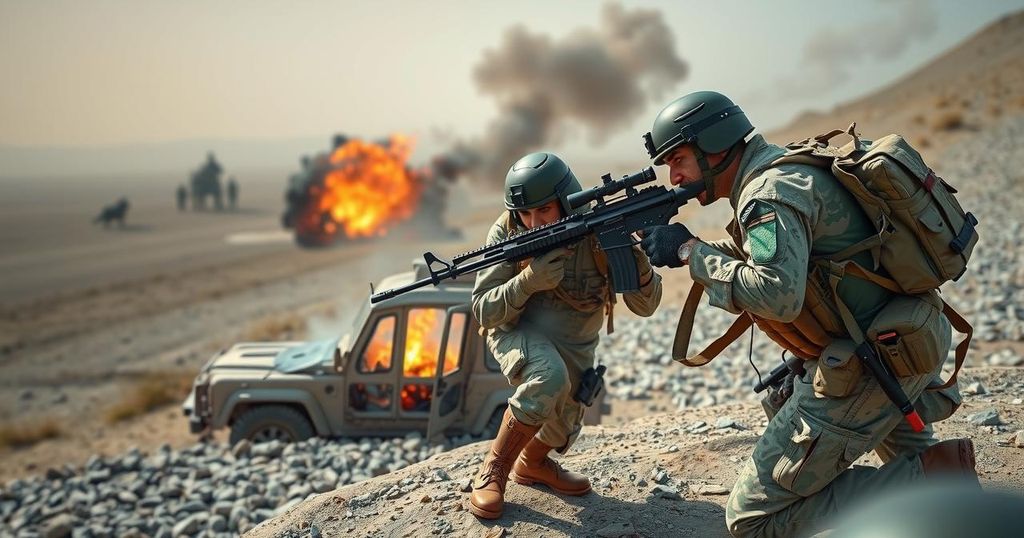Rising Tensions: Pakistani Soldier Killed Amid Clashes with Afghan Forces
Cross-border clashes between Pakistani paramilitary forces and Afghan troops resulted in one soldier’s death and multiple injuries, following deadly air strikes in Afghanistan accused of killing civilians. Protests erupted in Afghanistan against Pakistan, demanding accountability and action against military aggression. Military tensions have escalated since the Taliban’s return to power in Afghanistan, with accusations from both sides reflecting a continuing cycle of violence and instability along the border.
A Pakistani paramilitary soldier lost his life, and seven others sustained injuries during cross-border confrontations with Afghan troops, according to a security source. These exchanges of fire took place amidst heightened tensions following deadly air strikes in Afghanistan, which the Taliban claims resulted in significant civilian casualties. Sporadic fighting erupted between Khyber Pakhtunkhwa province in Pakistan and Khost province in Afghanistan, with each side indicating that military actions were taken in response to provocations by the other.
The clashes intensified following accusations from Afghan authorities that Pakistani air strikes killed 46 individuals, predominantly women and children, within Afghanistan this week. Pakistani officials defended their actions, stating that the strikes targeted terrorist hideouts, while the federal government has yet to formally confirm these military operations. The situation on the border remains volatile, with several incidents of heavy fighting reported in Pakistan’s Kurram district.
Subsequently, protests erupted in Khost, with hundreds of Afghans demanding accountability for the civilian deaths. Participants in the demonstration called for global economic pressures on Pakistan to deter such military operations, emphasizing the importance of achieving peace in the region. “A path to peace must be put in place, or else the youth will not stay silent,” asserted protester Najibullah Zaland.
The recent hostilities mark a continuation of escalating tensions along the Afghanistan-Pakistan border, a situation exacerbated since the Taliban’s rise to power in 2021. Islamabad has accused the Afghan government of sheltering militias involved in attacks across the border, a claim that remains contested by Kabul. The ongoing cycle of violence necessitates a thorough investigation into the casualties caused by military actions, especially those impacting innocent civilians and children. In light of these events, UNICEF has expressed deep concern regarding reports of child fatalities during the latest incidents.
The relationship between Afghanistan and Pakistan has been characterized by tension and conflict, particularly since the Taliban regained control in Afghanistan in 2021. Escalations along the border have involved military actions from both sides, with accusations of terrorism and cross-border raids becoming commonplace. The recent air strikes by Pakistan have drawn significant outrage, particularly from the Afghan Taliban, leading to protests and calls for justice regarding civilian deaths. This recurring cycle of violence has highlighted a broader regional instability exacerbated by militant activity, notably from organizations like the Tehreek-e-Taliban Pakistan (TTP).
The recent clashes between Pakistani and Afghan forces underscore the fragile nature of security along their shared border, particularly in light of accusations surrounding civilian casualties. As both nations navigate this complex landscape of blame, protest, and violence, the call for accountability and peace remains critical. International attention to this matter could be vital to de-escalating tensions and preventing further loss of life, especially among civilians. The situation continues to evolve, necessitating the urgent need for diplomatic efforts to restore stability in the region.
Original Source: www.ndtv.com








Post Comment